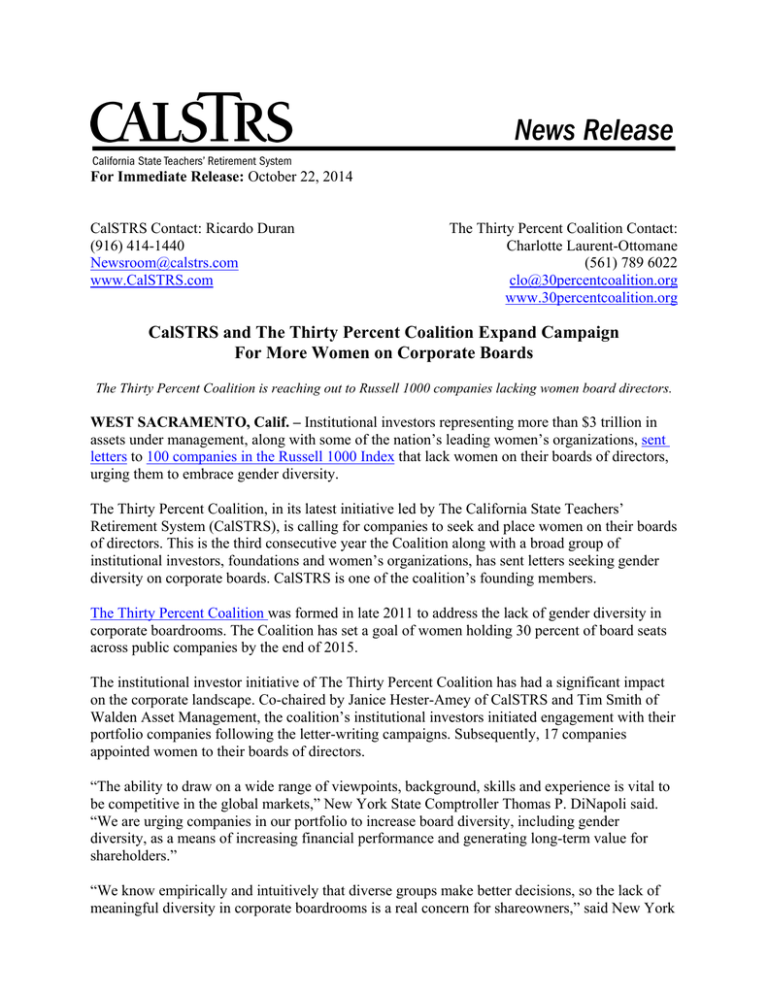Thirty Percent Coalition Initiative on Board Diversity
advertisement

For Immediate Release: October 22, 2014 CalSTRS Contact: Ricardo Duran (916) 414-1440 Newsroom@calstrs.com www.CalSTRS.com The Thirty Percent Coalition Contact: Charlotte Laurent-Ottomane (561) 789 6022 clo@30percentcoalition.org www.30percentcoalition.org CalSTRS and The Thirty Percent Coalition Expand Campaign For More Women on Corporate Boards The Thirty Percent Coalition is reaching out to Russell 1000 companies lacking women board directors. WEST SACRAMENTO, Calif. – Institutional investors representing more than $3 trillion in assets under management, along with some of the nation’s leading women’s organizations, sent letters to 100 companies in the Russell 1000 Index that lack women on their boards of directors, urging them to embrace gender diversity. The Thirty Percent Coalition, in its latest initiative led by The California State Teachers’ Retirement System (CalSTRS), is calling for companies to seek and place women on their boards of directors. This is the third consecutive year the Coalition along with a broad group of institutional investors, foundations and women’s organizations, has sent letters seeking gender diversity on corporate boards. CalSTRS is one of the coalition’s founding members. The Thirty Percent Coalition was formed in late 2011 to address the lack of gender diversity in corporate boardrooms. The Coalition has set a goal of women holding 30 percent of board seats across public companies by the end of 2015. The institutional investor initiative of The Thirty Percent Coalition has had a significant impact on the corporate landscape. Co-chaired by Janice Hester-Amey of CalSTRS and Tim Smith of Walden Asset Management, the coalition’s institutional investors initiated engagement with their portfolio companies following the letter-writing campaigns. Subsequently, 17 companies appointed women to their boards of directors. “The ability to draw on a wide range of viewpoints, background, skills and experience is vital to be competitive in the global markets,” New York State Comptroller Thomas P. DiNapoli said. “We are urging companies in our portfolio to increase board diversity, including gender diversity, as a means of increasing financial performance and generating long-term value for shareholders.” “We know empirically and intuitively that diverse groups make better decisions, so the lack of meaningful diversity in corporate boardrooms is a real concern for shareowners,” said New York City Comptroller Scott M. Stringer. “We are committed to accelerating the glacial pace of change at our portfolio companies which lack diversity, and we can achieve that through collaboration with our fellow investors in the Thirty Percent Coalition.” A Catalyst 2013 census of Fortune 500 companies found that women held only 16.9 percent of corporate board seats in 2013, essentially unchanged from the 16.6 percent in 2012. More broadly, ION’s “Annual Census of Women Board Directors and Executive Officers 2014,” which includes data from companies in the Russell 3000 index, found that women comprised 13 percent of sample companies’ board seats. Furthermore, women comprised only 13 percent of executive officers. “Corporate boards should reflect the diversity of the communities in which they operate and from which they profit,” said California State Treasurer Bill Lockyer, who sits on the CalSTRS and CalPERS governing boards. “If boards become more inclusive and increase the proportion of women directors, they will better serve the interests of their customers and shareholders. And everyone will gain.” The Alliance for Board Diversity’s survey of Fortune 100 companies found similarly dismal statistics on ethnic diversity with African American men filling 7 percent, Asian Pacific men 1.9 percent, and Hispanic and Latino men 3.5 percent of total corporate board seats. CalPERS Director of Corporate Governance Anne Simpson said: “Diversity is an essential element in board quality. It is time for the jibe ‘male, pale and stale’ to be retired. Companies operate in diverse, complex markets. They need diverse boards to meet both the challenges and opportunities of a diverse business world.” “This latest initiative more than doubled the assets under management represented in our last letter-writing campaign and added an additional 27 new investors as signatories to the letter. This latest letter is but one important step in a series of planned actions by investor members of the Coalition, who will engage these companies, from private dialogue all the way to shareholder resolutions for votes at stockholder meetings,” said Charlotte Laurent-Ottomane, executive director of The Thirty Percent Coalition. Numerous studies have underscored the nexus between greater board and management diversity with improved corporate governance and long-term financial performance. With women at the table, discussions are much richer, the decision making process is more effective and management is more innovative. “We don’t limit this diversity goal to gender,” added CalSTRS Corporate Governance Director Anne Sheehan. “We believe that diversity of age, ethnicity, culture, experience and education enrich the effectiveness and efficiency of boards. Nevertheless, in a world where women are growing drivers of the financial and consumer sectors, and are among the best educated in society, it seems only right to increase their presence in the boardroom.” There are resources for companies wishing to inject diversity to their boardrooms. The Thirty Percent Coalition makes model charter language available to help companies set standards and goals in this area. Coalition members also offer their portfolio companies’ access to the Diverse Director DataSource, or 3-D, one source for finding qualified candidates. About the Thirty Percent Coalition The Thirty Percent Coalition is a unique and groundbreaking national organization of close to 70 members committed to the goal of women holding 30 percent of board seats across public companies by the end of 2015. Founded in late 2011, the coalition includes senior business executives, national women's organizations, institutional investors, corporate governance experts and board members for the first time working together to drive the pace of change. The coalition's work is on the demand side of board diversity – influencing corporations to strengthen their efforts to increase the number of women on their boards. There is no other organization of this kind in the United States. About CalSTRS The California State Teachers’ Retirement System, with a portfolio valued at $186.4 billion as of September 30, 2014, is the largest educator-only pension fund in the world. CalSTRS administers a hybrid retirement system, consisting of traditional defined benefit, cash balance and voluntary defined contribution plans. CalSTRS also provides disability and survivor benefits. CalSTRS serves California's 868,000 public school educators and their families from the state’s 1,600 school districts, county offices of education and community college districts.



